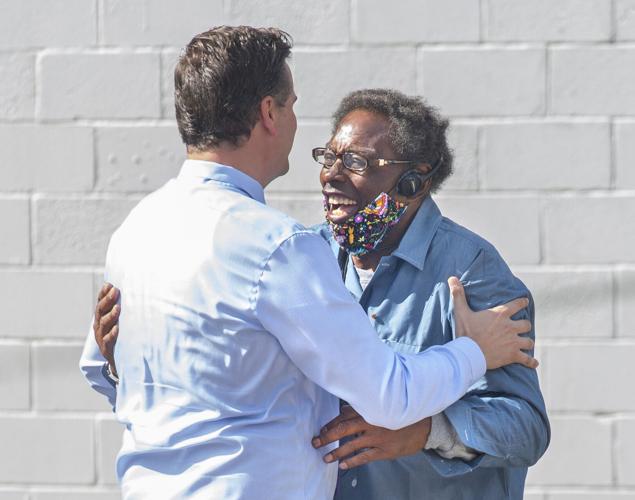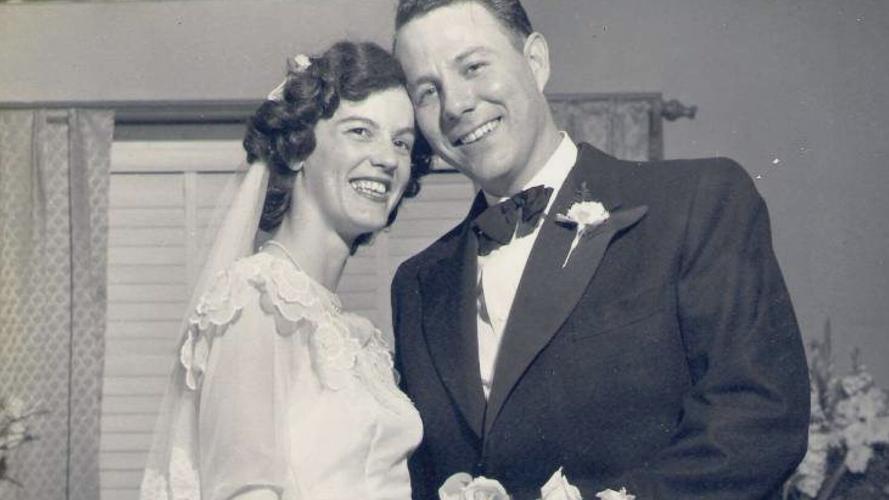When Henry Montgomery was incarcerated as a teenager in 1963 for killing an East Baton Rouge Parish sheriff’s deputy, John F. Kennedy was still alive and Dr. Martin Luther King Jr. had given his “I Have a Dream” speech just three months earlier.
On Wednesday, after nearly six decades behind bars, Montgomery walked out of the Louisiana State Penitentiary at Angola a free man after the state’s Board of Pardons and Committee on Parole voted unanimously to release the 75-year-old.
For criminal justice advocates across Louisiana — and the country — the decision was a victory five years in the making.
Montgomery’s case first entered the national consciousness in 2016, when it played a central role in a landmark ruling on juvenile sentences, Montgomery v. Louisiana, in which the U.S. Supreme Court ruled that youth offenders cannot be sentenced to mandatory life without parole, even in prior cases, deeming such punishments unconstitutional.
Following the Supreme Court’s decision, Montgomery was re-sentenced to life with the opportunity for parole, but was denied freedom twice, first in 2018 and again in 2019.
“Henry coming home sends a signal that you can overcome the worst thing you ever did,” said Andrew Hundley, Executive Director of the Parole Project, an organization founded shortly after the 2016 ruling. He has long advocated for the release of Montgomery and others like him.
“It tells young people 'we do value your life as a young person, and we do want you to redeem yourself,” he said.
Henry Montgomery was convicted of fatally shooting Charles Hurt, an East Baton Rouge sheriff’s deputy.
Fifty-eight years ago this week, the then-17-year-old was accused of killing East Baton Rouge Sheriff’s Deputy Charles Hurt after Hurt caught him playing hooky from school. Montgomery was later sentenced to death.
According to Advocate and court records, Montgomery had skipped class and was walking near Scotlandville High School when he came across Hurt, 40, and other deputies as they investigated a separate theft complaint that had been called in by the school.
When Hurt tried to detain Montgomery, the teen shot him once with a .22-caliber pistol, leaving Hurt’s three children, Michael Francis, 11, Becky Jo, 8, and Linda Ann, 6, fatherless and spurring a city-wide manhunt.
An Advocate article from the time reported that in response to Hurt’s killing — the first of a law enforcement officer for the city in 30 years — more than 60 Black men were arrested at roadblocks set up “as some 300 law enforcement officers converged on Scotlandville.”
Montgomery ultimately confessed to the killing, leading investigators to a block building at the rear of his home on Hooper Road where the murder weapon lay hidden among a mass of cobwebs. He told authorities he was panicking when he shot Hurt outside his school.
In 1966, Louisiana’s Supreme Court threw out Montgomery’s conviction after it determined he hadn’t received a fair trial. The case was then retried and Montgomery was convicted again, this time receiving a sentence of life in prison.
His 2019 attempt at parole was denied after one previous board member, Brennan Kelsey, voted against it, stating at the time that he believed Montgomery still needed to take more classes and complete more programming — a sentiment also expressed by a different board during Montgomery’s first hearing in 2018.
Montgomery’s lawyer, Keith Nordyke, protested the decision, calling his client “a force for change and a force for good,” adding that prison officials had worked hard following the first court’s decision to find additional classes for Montgomery to take.
Nordyke noted that during his incarceration, Montgomery started a boxing club, was involved in a Methodist church ministry and organized a literacy program for fellow inmates that included helping them write letters home. He said Montgomery completed several programs, including anger management and victim awareness classes.
The results of Wednesday’s hearing are the most recent signal of a cultural shift in law enforcement and public attitudes towards offenders, which for decades leaned heavily in favor of “tough on crime” approaches that left little room or opportunity for redemption when it came to society’s youngest offenders.
In a 2012 Supreme Court case, Miller v. Alabama, the court ruled, similarly to its 2016’s decision, that sentencing underage offenders to life without parole was “cruel and unusual” punishment.
Since then, 18 states and the District of Columbia have banned life without parole for juveniles, bringing the total number to 24.
In the five years since its founding, the Parole Project has helped free more than 220 men and women sentenced to die in prison, including 90 who were sentenced before the age of 18.
Twelve of those men and women gathered inside a room at the Parole Project’s headquarters in downtown Baton Rouge Wednesday to listen over a video call as Montgomery, now partially deaf, sat through his final hearing.
For Hundley, the first inmate to be freed following the Supreme Court’s 2016 ruling, the moment was bittersweet. While he and others enjoyed their newfound freedom, they have also long carried the weight of guilt knowing that Montgomery, the man for whom the organization was formed, remained behind bars.
At Montgomery’s advanced age, Hundley continued, he won’t have access to the same opportunities as other men and women who have been released.
“Having Henry home means so much to those of us who have benefitted from Montgomery v. Louisiana,” Hundley said. “I have been able to reap the benefits of his petition before the court. I’ve graduated twice. I’ve started a nonprofit organization. I’ve started a family. I’m an active member of my community.
“Every day I would wake up and realize here I am, someone who did such a small percentage of my life in prison compared to Henry, and I’ve been given so many opportunities. Henry will never have the opportunities that I’ve had.”
While advocates fought hard for Montgomery’s release, Hurt’s family remained opposed to the notion. During his parole hearing, Hurt’s youngest daughter stated she believed her father’s killer felt no remorse for his actions, adding that she was appalled to learn that the Parole Project intended to move Montgomery to East Baton Rouge Parish, near where Hurt’s surviving relatives still live.
"I think it shows great disrespect to all officers for him to be released," Linda Hurt said. "I don't believe he's sorry. I was raised to believe that if you make a mistake, you suffer the consequences. He made a decision at 17 years old. You know right from wrong at 17 years old.”
Wednesday, Montgomery expressed the guilt he said he still feels over the events of that day.
“I’m real sorry that it happened,” he told Hurt’s family. “I’m going to deal with this all my life, for the rest of my life.”
In a statement to The Advocate, District Attorney Hillar Moore III also expressed concern over plans to relocate Montgomery to Baton Rouge, noting that at previous hearings, it was explicitly stated that he would not reside in the area. The plan years ago was to move Montgomery to Opelousas, lawyers in the case said Wednesday.
Moore argued Montgomery’s release to East Baton Rouge would only serve to reopen “longstanding wounds.”
“We recognize the difficulty in the decision the parole board made today and respect it,” Moore said. “We also acknowledge Mr. Montgomery’s youthful age at the time he committed the murder of Deputy Charles Hurt, as well as the decades-long sentence he has served.”
All three board members expressed their condolences to Hurt's family, but pointed to Montgomery’s exemplary record during the 58 years spent behind bars, saying they felt Montgomery had done his time and demonstrated considerable progress during his nearly six decades of incarceration.
There was nothing more to be gained by keeping him behind bars.
As part of his parole guidelines, Montgomery will have a curfew from 9 p.m. to 6 a.m. and is prohibited from contacting Hurt’s family in any way.
After the board’s decision Wednesday, Nordyke noted that the world his client is preparing to enter looks very different from the one he left behind all those years ago.
Montgomery began his sentence long before the dawn of the internet, cell phones and social media, he continued, which has made it difficult for him to comprehend just how far-reaching his story has become.
"Henry has been here throughout tremendous advances in history," Nordyke said. "He's got a lot of catching up to do."












